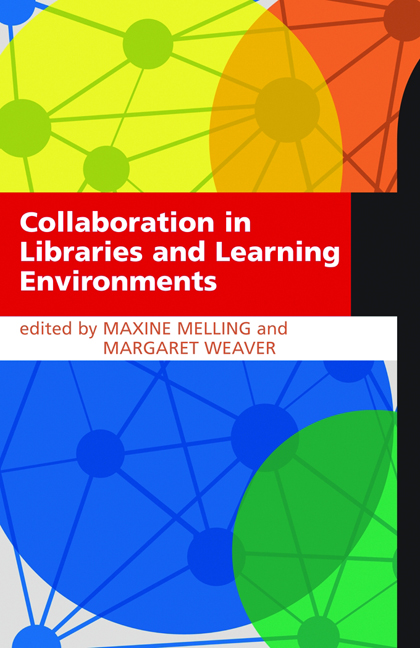Book contents
- Frontmatter
- Contents
- Contributors
- Introduction
- Abbreviations
- 1 The changing higher education context
- 2 Connecting with the student perspective
- 3 Working with professional associations
- 4 Culture, values and change: observations from three consortia in Canada
- 5 Managing complex change collaboratively
- 6 Leadership skills for collaboration: future needs and challenges
- 7 Knowing me … knowing you: the role of technology in enabling collaboration
- 8 Space: changing the boundaries
- 9 Collaborative service provision through super-convergence
- 10 Joint-use libraries and transformational change
- Index
3 - Working with professional associations
Published online by Cambridge University Press: 08 June 2018
- Frontmatter
- Contents
- Contributors
- Introduction
- Abbreviations
- 1 The changing higher education context
- 2 Connecting with the student perspective
- 3 Working with professional associations
- 4 Culture, values and change: observations from three consortia in Canada
- 5 Managing complex change collaboratively
- 6 Leadership skills for collaboration: future needs and challenges
- 7 Knowing me … knowing you: the role of technology in enabling collaboration
- 8 Space: changing the boundaries
- 9 Collaborative service provision through super-convergence
- 10 Joint-use libraries and transformational change
- Index
Summary
Acknowledgements
Thanks are due to the representatives and members of professional associations (in the UK and overseas) who provided information and advice for this chapter.
Introduction
The distinct career path for a ‘professional’ higher education (HE) administrator is a relatively new development. However, the professional associations in the UK have a long history; the Association of University Administrators (AUA) celebrated its golden jubilee in 2011, SCONUL (the Society of College, National and University Libraries) is over 60 years old and AMOSSHE, The Student Services Organisation, turns 20 in 2012, with its predecessor organization tracing a history back nearly 40 years. Professional associations have a variety of identities including as formalized sector bodies, lobbying groups, informal networks and incorporated organizations and societies. Professional associations are normally funded through membership subscriptions and operate as non-profit organizations. They usually seek to further a particular profession and/or the interests of their own membership. In the context of this chapter we consider professional associations in their roles fostering professional practice, professional identity and professional development, the focus being ‘individual commitment to, and membership of, a professional community’ (Hallas in West, 2011, 3).
The professional association landscape has evolved at an accelerated pace in the last 20 years, with increasing numbers of organizations and a growing prominence across a range of sectors. The Professional Associations Research Network (PARN) has commented:
Professional occupations have increased substantially in the last two decades. Growth has taken place not only in the traditional professions, but also in new professions that have emerged as changes in the nature of commerce, the values of society and advances in technology demand new skills and new specialisms.
(PARN, 2012)PARN estimates that there are over 400 professional associations in the UK. It is likely that this is an underestimation, with easily 50 representing career specialisms in UK HE alone. In just this chapter, we reference over 20 professional associations supporting the HE student experience.
The HE landscape has also evolved significantly in the last 20 years. This degree of sector change, incorporating changing policy-drivers impacting on institutional missions, rising service demands and student expectations, new sector entrants and an increasing role for the private sector, means that HE professionals are increasingly reliant on their professional associations to keep abreast of sector developments and to maintain their continuing professional development (CPD) and level of expertise.
- Type
- Chapter
- Information
- Collaboration in Libraries and Learning Environments , pp. 33 - 50Publisher: FacetPrint publication year: 2012



